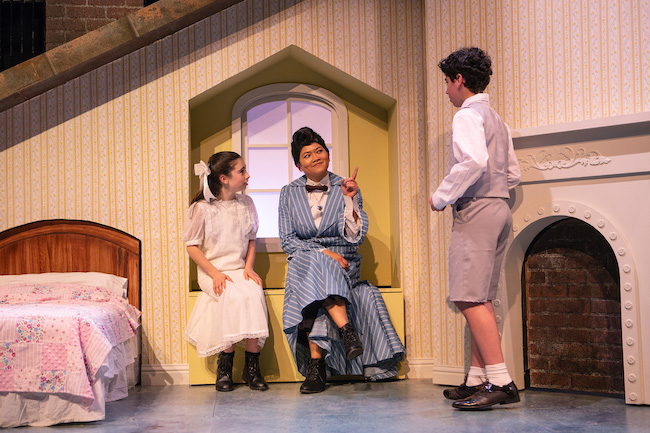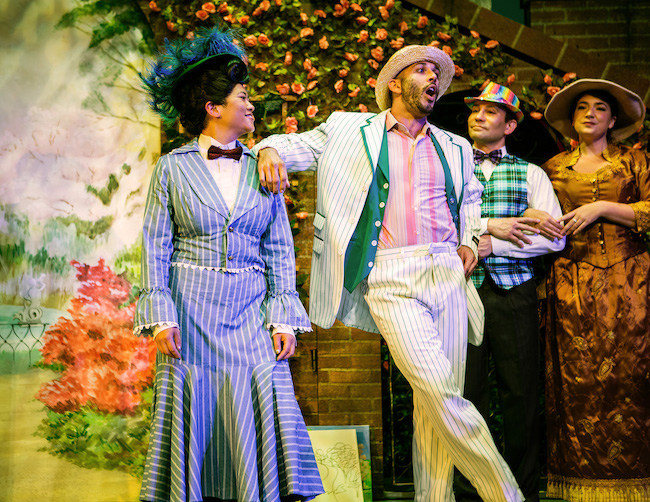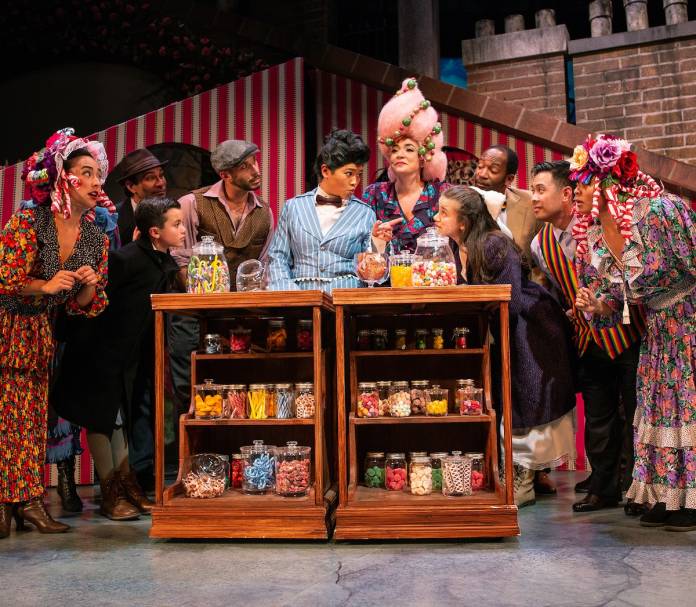ONSTAGE El Beh, who plays the title role in San Francisco Playhouse’s Mary Poppins (through January 12), never would have thought to play the no-nonsense nanny who comes in on the wind with her parrot-headed umbrella and whips the Banks family into shape.
They got the part when Susi Damilano, the director, bumped into them on the street and asked Beh just to consider taking the role. Beh, who along with singing, dancing and acting, teaches theater to middle school students and movement and music to toddlers, decided to do it. Part of the reason was representation.
“It really meant something to me to have a queer person of color in that role,” they said. “I was thinking about my kiddos getting to see that and how much that would mean, so I thought, I can’t walk away from that—I have to be brave enough to consider it. My social justice has to line up with my art or it’s just not worth doing. And I decided it was.”

P.L. Travers wrote a series of books about Mary Poppins, the nanny who comes to the Banks family when the two children, Jane and Michael, have driven their other nannies away. Their father works at the bank, and in the play, has little time for his children—their mother used to be an actress, but now tries to meet her husband’s exacting standards for the house and children.
Mary Poppins, who has a high regard for herself and does a lot of sniffing to signify disapproval, takes the children on magical adventures. Bill English, co-founder of the Playhouse with Damilano, writes in the program that the books drew unexpected fans like Sylvia Plath and T.S. Eliot. According to English, Australian immigrant Travers wrote the books as a commentary on class: Mary Poppins teaches empathy and compassion for the poor.
Beh’s first encounter with Mary Poppins was the Disney movie with Julie Andrews (which Travers supposedly hated), when she was very young. They liked it but weren’t swept away. But they found playing the role of enigmatic nanny rich and interesting.
“She’s kind of single-handedly dismantling the patriarchy in this world,” Beh said. “And she’s not fascistically telling them how to do it. There’s a line I love that can be played tongue in cheek, but I think it’s absolutely her truth: When they’re going to the bank and Michael says she put it into her father’s head, Mary says, ‘The impudence! I would never put ideas into someone’s head,’ I think that she would be horrified at the idea of putting ideas into anyone’s head—she might guide them, but they have to come to it themselves.”
Dismantling the patriarchy is exactly what Beh wants their art to do, and Mary Poppins does it in a loving way, they think.
“I toggle between being able to do that work through love—and feeling like, ‘Burn it all to the ground.’ It’s good to sit with doing it through love, and I’ve been in a burn it all to the ground mood for a while,” they said. “The thing about doing it with love is it lasts longer. She’s doing real facilitation, so the other characters come to it themselves.”

Beh finds a lot of joy in the role. For one thing there’s the reaction of children in the audience. Then they get to co-star with their best friend, Wiley Naman Strasser, who plays Bert, the chimney sweep, who dances across the rooftops.
Beh’s many productions include Black Rider, Our Town, and Hamlet at the Shotgun Players, Into the Woods and Bloody Bloody Andrew Jackson at the Playhouse, and playing the cello and singing in Taylor Mac’s A 24-Decade History of Popular Music. Beh grew up singing and dancing—and their mother made sure to take them to see plays when they were young. It was studying theater at UC Berkeley that made them decide on this as a career.
“That’s where I learned how my art makes a difference in the world,” Beh said. “And what it could do as activism.”
MARY POPPINS: THE BROADWAY MUSICAL
Through January 12
San Francisco Playhouse
Tickets and more info here








